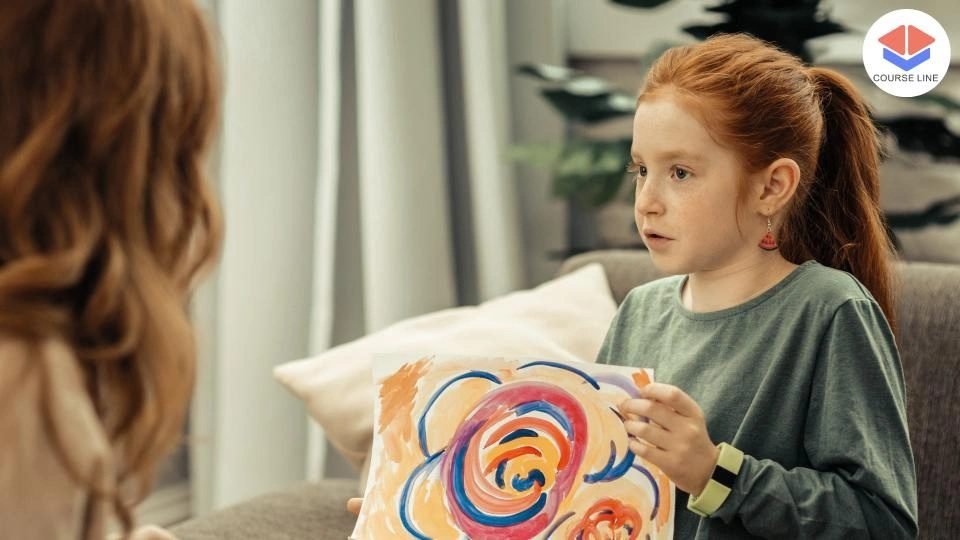Course Features
Price
Study Method
Online | Self-paced
Course Format
Reading Material - PDF, article
Duration
5 hours, 45 minutes
Qualification
No formal qualification
Certificate
At completion
Additional info
Coming soon
- Share
Overview
"Play Therapy in Family Counseling: Strengthening Relationships" is designed to provide a deep understanding of how play therapy can be effectively utilized to address family dynamics and challenges. This course explores the key aspects of play therapy, focusing on its benefits in family counseling and its relevance in promoting emotional expression, healing, and communication among family members. The curriculum begins with an introduction to play therapy, including its history, benefits, and cultural sensitivity within the UK context.
The course dives into the stages of child development, demonstrating how play supports emotional expression and learning. Students will learn various play-based assessment techniques and develop skills in sandplay therapy, art therapy, role-playing, storytelling, and the use of puppetry and play figures. These techniques are crucial for helping children express emotions that are difficult to verbalize.
Students will also explore how to integrate play therapy into family counseling, focusing on practical strategies for introducing play therapy to families and balancing it with traditional talk therapy. The course covers specific family issues such as sibling rivalry, divorce, trauma, and grief, showing how play therapy can provide a pathway for healing and conflict resolution.
Further, the course offers insight into the cultural and contextual perspectives of play therapy, helping practitioners adapt techniques for various family dynamics. Case studies and hands-on practice will equip students with the skills necessary to assess and evaluate the effectiveness of play therapy in real-life situations. Ethical considerations, professional boundaries, and legal requirements in the UK are also emphasized throughout the course to ensure a comprehensive understanding of play therapy in family counseling.
Who is this course for?
"Play Therapy in Family Counseling: Strengthening Relationships" is designed to provide a deep understanding of how play therapy can be effectively utilized to address family dynamics and challenges. This course explores the key aspects of play therapy, focusing on its benefits in family counseling and its relevance in promoting emotional expression, healing, and communication among family members. The curriculum begins with an introduction to play therapy, including its history, benefits, and cultural sensitivity within the UK context.
The course dives into the stages of child development, demonstrating how play supports emotional expression and learning. Students will learn various play-based assessment techniques and develop skills in sandplay therapy, art therapy, role-playing, storytelling, and the use of puppetry and play figures. These techniques are crucial for helping children express emotions that are difficult to verbalize.
Students will also explore how to integrate play therapy into family counseling, focusing on practical strategies for introducing play therapy to families and balancing it with traditional talk therapy. The course covers specific family issues such as sibling rivalry, divorce, trauma, and grief, showing how play therapy can provide a pathway for healing and conflict resolution.
Further, the course offers insight into the cultural and contextual perspectives of play therapy, helping practitioners adapt techniques for various family dynamics. Case studies and hands-on practice will equip students with the skills necessary to assess and evaluate the effectiveness of play therapy in real-life situations. Ethical considerations, professional boundaries, and legal requirements in the UK are also emphasized throughout the course to ensure a comprehensive understanding of play therapy in family counseling.
Requirements
"Play Therapy in Family Counseling: Strengthening Relationships" is designed to provide a deep understanding of how play therapy can be effectively utilized to address family dynamics and challenges. This course explores the key aspects of play therapy, focusing on its benefits in family counseling and its relevance in promoting emotional expression, healing, and communication among family members. The curriculum begins with an introduction to play therapy, including its history, benefits, and cultural sensitivity within the UK context.
The course dives into the stages of child development, demonstrating how play supports emotional expression and learning. Students will learn various play-based assessment techniques and develop skills in sandplay therapy, art therapy, role-playing, storytelling, and the use of puppetry and play figures. These techniques are crucial for helping children express emotions that are difficult to verbalize.
Students will also explore how to integrate play therapy into family counseling, focusing on practical strategies for introducing play therapy to families and balancing it with traditional talk therapy. The course covers specific family issues such as sibling rivalry, divorce, trauma, and grief, showing how play therapy can provide a pathway for healing and conflict resolution.
Further, the course offers insight into the cultural and contextual perspectives of play therapy, helping practitioners adapt techniques for various family dynamics. Case studies and hands-on practice will equip students with the skills necessary to assess and evaluate the effectiveness of play therapy in real-life situations. Ethical considerations, professional boundaries, and legal requirements in the UK are also emphasized throughout the course to ensure a comprehensive understanding of play therapy in family counseling.
Career path
"Play Therapy in Family Counseling: Strengthening Relationships" is designed to provide a deep understanding of how play therapy can be effectively utilized to address family dynamics and challenges. This course explores the key aspects of play therapy, focusing on its benefits in family counseling and its relevance in promoting emotional expression, healing, and communication among family members. The curriculum begins with an introduction to play therapy, including its history, benefits, and cultural sensitivity within the UK context.
The course dives into the stages of child development, demonstrating how play supports emotional expression and learning. Students will learn various play-based assessment techniques and develop skills in sandplay therapy, art therapy, role-playing, storytelling, and the use of puppetry and play figures. These techniques are crucial for helping children express emotions that are difficult to verbalize.
Students will also explore how to integrate play therapy into family counseling, focusing on practical strategies for introducing play therapy to families and balancing it with traditional talk therapy. The course covers specific family issues such as sibling rivalry, divorce, trauma, and grief, showing how play therapy can provide a pathway for healing and conflict resolution.
Further, the course offers insight into the cultural and contextual perspectives of play therapy, helping practitioners adapt techniques for various family dynamics. Case studies and hands-on practice will equip students with the skills necessary to assess and evaluate the effectiveness of play therapy in real-life situations. Ethical considerations, professional boundaries, and legal requirements in the UK are also emphasized throughout the course to ensure a comprehensive understanding of play therapy in family counseling.
-
- Overview of Play Therapy 00:10:00
- Benefits of Play Therapy in Family Counseling 00:10:00
- Cultural Sensitivity in the UK Context 00:10:00
-
- Understanding Child Development Stages 00:10:00
- How Play Supports Emotional Expression 00:10:00
- Play-Based Assessment Techniques 00:10:00
- Sandplay Therapy 00:10:00
- Art Therapy 00:10:00
- Role-Playing and Storytelling 00:10:00
- Puppetry and Play Figures 00:10:00
- Play Therapy for Sibling Rivalry 00:10:00
- Play Therapy for Divorce and Separation 00:10:00
- Play Therapy for Trauma and Grief 00:10:00
- Hands-on Practice of Play Therapy Techniques 00:10:00
- Role-Playing and Supervised Sessions 00:10:00
- Feedback and Reflection 00:10:00
- Ethical Considerations in Play Therapy 00:10:00
- Legal Requirements in the UK 00:10:00
- Maintaining Professional Boundaries 00:10:00
- Premium Certificate 00:15:00

No Reviews found for this course.
Is this certificate recognized?
Yes, our premium certificate and transcript are widely recognized and accepted by embassies worldwide, particularly by the UK embassy. This adds credibility to your qualification and enhances its value for professional and academic purposes.
I am a beginner. Is this course suitable for me?
Yes, this course is designed for learners of all levels, including beginners. The content is structured to provide step-by-step guidance, ensuring that even those with no prior experience can follow along and gain valuable knowledge.
I am a professional. Is this course suitable for me?
Yes, professionals will also benefit from this course. It covers advanced concepts, practical applications, and industry insights that can help enhance existing skills and knowledge. Whether you are looking to refine your expertise or expand your qualifications, this course provides valuable learning.
Does this course have an expiry date?
No, you have lifetime access to the course. Once enrolled, you can revisit the materials at any time as long as the course remains available. Additionally, we regularly update our content to ensure it stays relevant and up to date.
How do I claim my free certificate?
I trust you’re in good health. Your free certificate can be located in the Achievement section. The option to purchase a CPD certificate is available but entirely optional, and you may choose to skip it. Please be aware that it’s crucial to click the “Complete” button to ensure the certificate is generated, as this process is entirely automated.
Does this course have assessments and assignments?
Yes, the course includes both assessments and assignments. Your final marks will be determined by a combination of 20% from assignments and 80% from assessments. These evaluations are designed to test your understanding and ensure you have grasped the key concepts effectively.
Is this course accredited?
We are a recognized course provider with CPD, UKRLP, and AOHT membership. The logos of these accreditation bodies will be featured on your premium certificate and transcript, ensuring credibility and professional recognition.
Will I receive a certificate upon completion?
Yes, you will receive a free digital certificate automatically once you complete the course. If you would like a premium CPD-accredited certificate, either in digital or physical format, you can upgrade for a small fee.
Course Features
Price
Study Method
Online | Self-paced
Course Format
Reading Material - PDF, article
Duration
5 hours, 45 minutes
Qualification
No formal qualification
Certificate
At completion
Additional info
Coming soon
- Share
Acoustic Engineering Level 3 Advanced Diploma
Course Line240£490.00Original price was: £490.00.£14.99Current price is: £14.99.Engineering Management Level 3 Advanced Diploma
Course Line238£490.00Original price was: £490.00.£14.99Current price is: £14.99.Chemistry Students’ Guide to the Metric System: Prefixes, Units & Conversions
Course Line237£490.00Original price was: £490.00.£14.99Current price is: £14.99.





